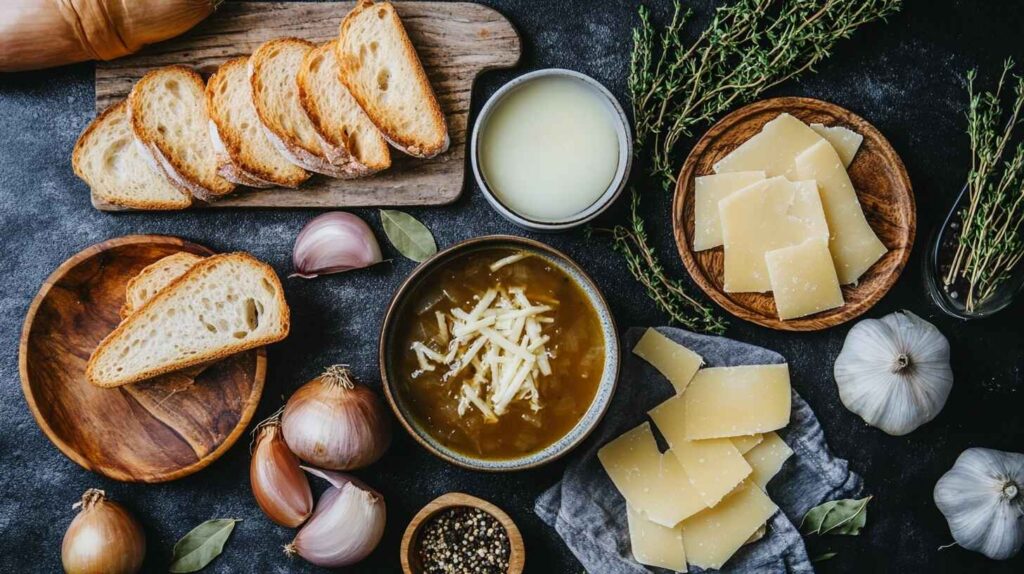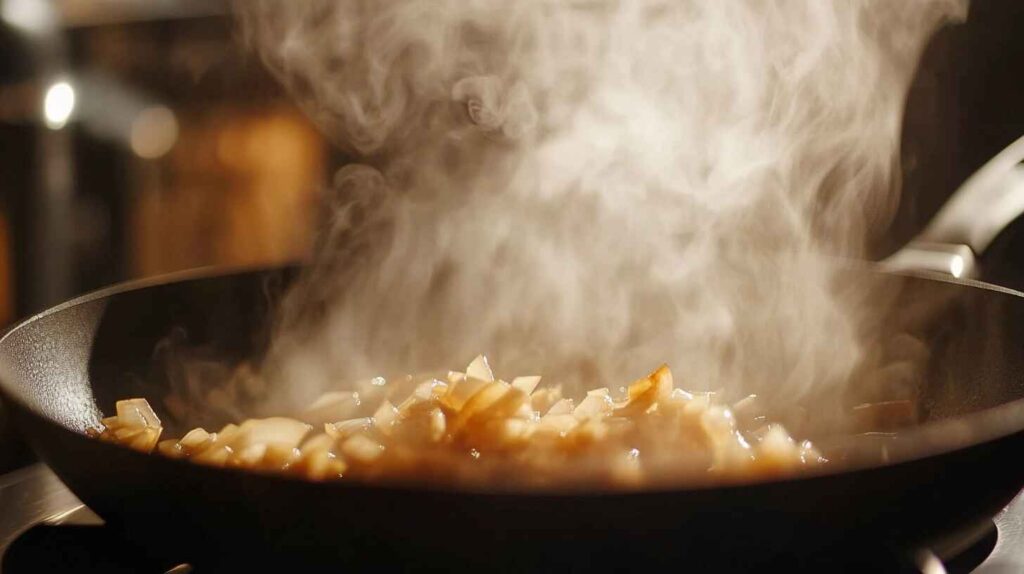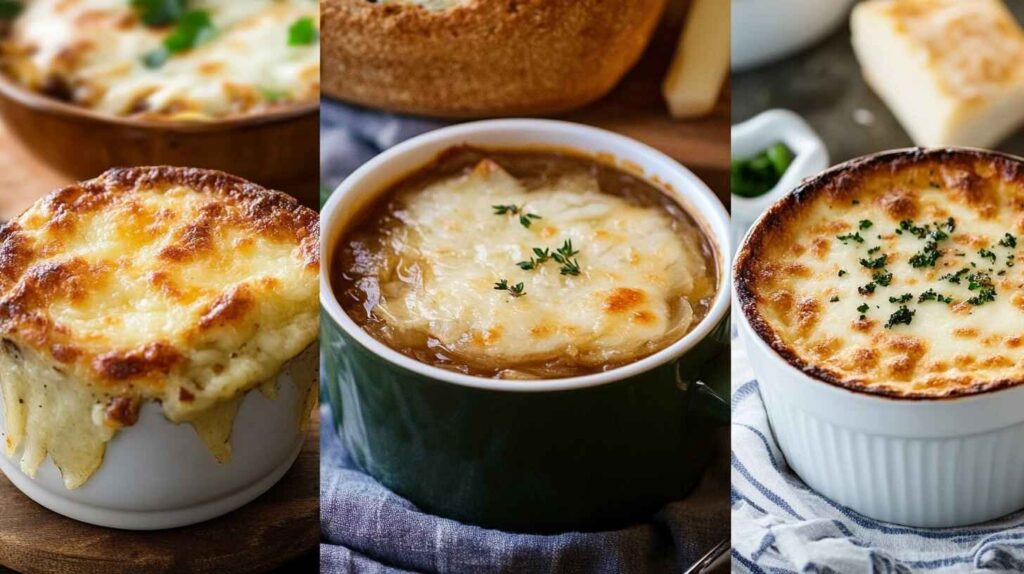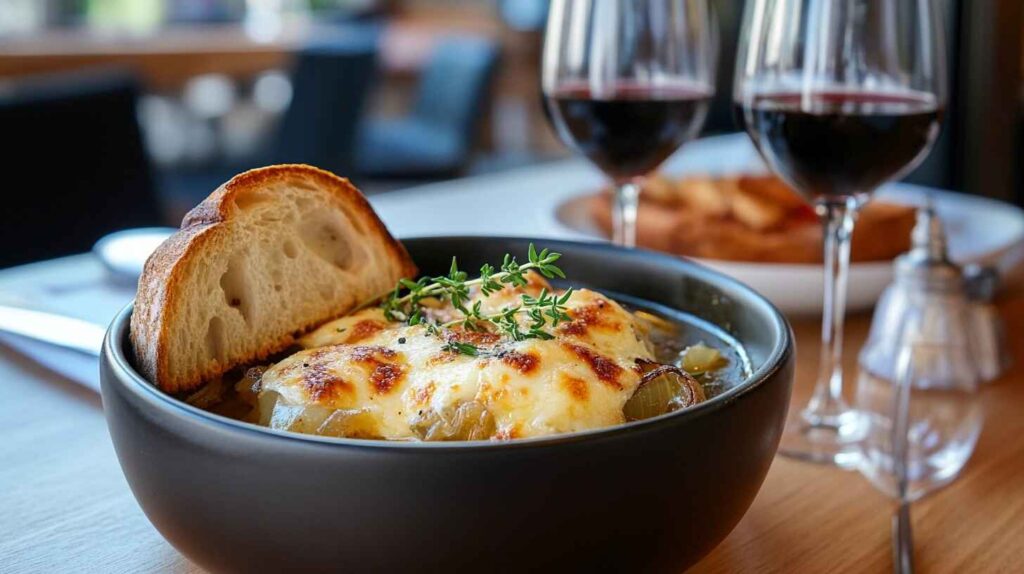There’s just something about a bowl of French Onion Soup that feels like a warm hug on a chilly day. The rich, savory broth, the sweetness of perfectly caramelized onions, and the cheesy, crusty top make it a dish that has stood the test of time. But have you ever wondered what makes this soup so special or how you can make it yourself at home? Let’s dive into the delicious world of French Onion Soup and uncover its secrets!
🧅 Introduction: Why French Onion Soup Continues to Captivate Taste Buds Worldwide
French Onion Soup isn’t just another soup; it’s a culinary masterpiece. From elegant French bistros to cozy family kitchens, this dish continues to steal the spotlight. Why? Because it hits all the right notes: sweet, savory, cheesy, and comforting. Plus, it’s surprisingly simple to make once you know the basics.
“A bowl of soup can be a small act of love, and French Onion Soup embodies that sentiment perfectly.” 🍲
The magic lies in the onions. When onions are slowly cooked until golden brown, they release natural sugars that create a deep, complex flavor. Paired with a flavorful broth and a golden, cheesy topping, it’s no wonder people can’t resist it.
🏛️ The History of French Onion Soup: From Humble Beginnings to Global Fame
Believe it or not, French Onion Soup wasn’t always the elegant dish we know today. Its origins trace back to ancient times when onions were a dietary staple because they were cheap, easy to grow, and lasted a long time.
🍽️ Origins in French Cuisine: A Peasant Dish Turned Gourmet Delight
In 18th-century France, onion soup was considered food for the poor. Onions were abundant and affordable, making the soup a practical meal during tough times. The transformation into a gourmet dish happened when chefs in Parisian restaurants started serving it with toasted bread and melted cheese on top, elevating its status.
🌍 The Role of Onions in Ancient Cuisines
Interestingly, onions were revered by many ancient civilizations. Egyptians believed onions had mystical properties, while the Romans used them to boost strength among soldiers. Little did they know their humble onion would one day star in one of the world’s most beloved soups.
🥣 Key Ingredients of Authentic French Onion Soup

Creating the perfect French Onion Soup requires just a few ingredients, but the quality and technique make all the difference. Let’s break down what you need:
| Ingredient | Purpose |
|---|---|
| Onions (yellow or sweet) | The star of the show, delivering natural sweetness |
| Beef broth | Provides a rich, savory base |
| Dry white wine | Adds acidity to balance the sweetness |
| Gruyère cheese | Melts into a gooey, golden crust |
| Baguette slices | For that satisfying crunch |
| Butter and olive oil | Helps caramelize the onions |
| Thyme and bay leaf | Infuse the broth with earthy aromas |
🧅 Choosing the Right Onions: Sweet vs. Yellow vs. Red
Onions are the heart and soul of this soup, but which kind should you use? Yellow onions are the classic choice because they strike a perfect balance between sweetness and sharpness. Sweet onions, like Vidalia, give the soup an extra hint of natural sugar, while red onions create a more robust flavor.
“The secret to great French Onion Soup is patience when caramelizing the onions. Rushing this step will rob the soup of its rich, sweet flavor.” 🔍
🍷 Broth Matters: Beef, Chicken, or Vegetarian Alternatives?
Traditionally, French Onion Soup uses beef broth for its deep, umami taste. However, chicken or vegetable broth can also work if you want a lighter version. The key is to use high-quality broth to ensure a rich, flavorful base.
🧀 The Cheese Debate: Gruyère, Comté, or Mozzarella?
While Gruyère is the go-to cheese for its nutty flavor and excellent melting properties, you can also experiment with Comté or even mozzarella if you want a milder taste.
🍽️ Step-by-Step Guide: How to Make French Onion Soup at Home

Now for the fun part—making your own batch of French Onion Soup from scratch! Follow these steps to create a restaurant-quality soup in your kitchen.
🛒 Ingredients:
- 6 large yellow onions, thinly sliced
- 4 tablespoons unsalted butter
- 2 tablespoons olive oil
- 1 teaspoon sugar
- 1/2 cup dry white wine
- 6 cups beef broth
- 2 bay leaves
- 1 teaspoon dried thyme
- Salt and pepper, to taste
- Baguette slices, toasted
- 2 cups grated Gruyère cheese
👩🍳 Directions:
- Caramelize the Onions:
- Heat butter and oil in a large pot over medium heat.
- Add onions and cook slowly for 45-60 minutes, stirring occasionally.
- Sprinkle with sugar halfway through to enhance the caramelization.
- Deglaze the Pot:
- Pour in the wine and scrape up any browned bits from the bottom.
- Let it simmer for 5 minutes.
- Simmer the Soup:
- Add the broth, bay leaves, thyme, salt, and pepper.
- Bring to a boil, then reduce heat and simmer for 30 minutes.
- Prepare the Bread:
- While the soup simmers, toast the baguette slices.
- Assemble and Broil:
- Ladle the soup into oven-safe bowls.
- Top each bowl with a baguette slice and a generous amount of cheese.
- Broil until the cheese is bubbly and golden.
“Patience is the key to caramelized onions. Give them time, and they’ll reward you with a deep, sweet flavor that makes this soup unforgettable.” 💡
🧑🍳 Common Problems and Their Solutions
Even seasoned cooks face challenges when making French Onion Soup. Here are some common issues and how to fix them:
1. Why Is My Soup Too Sweet?
- Cause: Over-caramelized onions or naturally sweet varieties.
- Fix: Add a splash of vinegar or dry wine to cut through the sweetness.
2. The Cheese Won’t Melt Properly
- Cause: Wrong cheese or incorrect broiling temperature.
- Fix: Use Gruyère and broil at high heat for a few minutes.
3. Mushy Onions
- Cause: Overcooking or not stirring enough.
- Fix: Caramelize onions slowly and evenly.
🥗 Health Benefits and Nutritional Information
You might not think of French Onion Soup as a “health food,” but it does have some surprising benefits. Onions contain antioxidants and compounds that support heart health, while the broth provides essential minerals.
| Nutrient | Amount per Serving (1 cup) |
|---|---|
| Calories | 350 |
| Protein | 12g |
| Fat | 15g |
| Carbohydrates | 40g |
| Fiber | 5g |
| Sodium | 800mg |
The soup is high in sodium due to the broth and cheese, so consider using low-sodium options if you’re watching your intake.
French Onion Soup: A Timeless Classic with a Modern Twist
There’s just something about a bowl of French Onion Soup that feels like a warm hug on a chilly day. The rich, savory broth, the sweetness of perfectly caramelized onions, and the cheesy, crusty top make it a dish that has stood the test of time. But have you ever wondered what makes this soup so special or how you can make it yourself at home? Let’s dive into the delicious world of French Onion Soup and uncover its secrets!
🧅 Introduction: Why French Onion Soup Continues to Captivate Taste Buds Worldwide
French Onion Soup isn’t just another soup; it’s a culinary masterpiece. From elegant French bistros to cozy family kitchens, this dish continues to steal the spotlight. Why? Because it hits all the right notes: sweet, savory, cheesy, and comforting. Plus, it’s surprisingly simple to make once you know the basics.
“A bowl of soup can be a small act of love, and French Onion Soup embodies that sentiment perfectly.” 🍲
The magic lies in the onions. When onions are slowly cooked until golden brown, they release natural sugars that create a deep, complex flavor. Paired with a flavorful broth and a golden, cheesy topping, it’s no wonder people can’t resist it.
🏛️ The History of French Onion Soup: From Humble Beginnings to Global Fame
Believe it or not, French Onion Soup wasn’t always the elegant dish we know today. Its origins trace back to ancient times when onions were a dietary staple because they were cheap, easy to grow, and lasted a long time.
🍽️ Origins in French Cuisine: A Peasant Dish Turned Gourmet Delight
In 18th-century France, onion soup was considered food for the poor. Onions were abundant and affordable, making the soup a practical meal during tough times. The transformation into a gourmet dish happened when chefs in Parisian restaurants started serving it with toasted bread and melted cheese on top, elevating its status.
🌍 The Role of Onions in Ancient Cuisines
Interestingly, onions were revered by many ancient civilizations. Egyptians believed onions had mystical properties, while the Romans used them to boost strength among soldiers. Little did they know their humble onion would one day star in one of the world’s most beloved soups.
🥣 Key Ingredients of Authentic French Onion Soup
Creating the perfect French Onion Soup requires just a few ingredients, but the quality and technique make all the difference. Let’s break down what you need:
| Ingredient | Purpose |
|---|---|
| Onions (yellow or sweet) | The star of the show, delivering natural sweetness |
| Beef broth | Provides a rich, savory base |
| Dry white wine | Adds acidity to balance the sweetness |
| Gruyère cheese | Melts into a gooey, golden crust |
| Baguette slices | For that satisfying crunch |
| Butter and olive oil | Helps caramelize the onions |
| Thyme and bay leaf | Infuse the broth with earthy aromas |
🧅 Choosing the Right Onions: Sweet vs. Yellow vs. Red
Onions are the heart and soul of this soup, but which kind should you use? Yellow onions are the classic choice because they strike a perfect balance between sweetness and sharpness. Sweet onions, like Vidalia, give the soup an extra hint of natural sugar, while red onions create a more robust flavor.
“The secret to great French Onion Soup is patience when caramelizing the onions. Rushing this step will rob the soup of its rich, sweet flavor.” 🔍
🍷 Broth Matters: Beef, Chicken, or Vegetarian Alternatives?
Traditionally, French Onion Soup uses beef broth for its deep, umami taste. However, chicken or vegetable broth can also work if you want a lighter version. The key is to use high-quality broth to ensure a rich, flavorful base.
🧀 The Cheese Debate: Gruyère, Comté, or Mozzarella?
While Gruyère is the go-to cheese for its nutty flavor and excellent melting properties, you can also experiment with Comté or even mozzarella if you want a milder taste.
🍽️ Step-by-Step Guide: How to Make French Onion Soup at Home
Now for the fun part—making your own batch of French Onion Soup from scratch! Follow these steps to create a restaurant-quality soup in your kitchen.
🛒 Ingredients:
- 6 large yellow onions, thinly sliced
- 4 tablespoons unsalted butter
- 2 tablespoons olive oil
- 1 teaspoon sugar
- 1/2 cup dry white wine
- 6 cups beef broth
- 2 bay leaves
- 1 teaspoon dried thyme
- Salt and pepper, to taste
- Baguette slices, toasted
- 2 cups grated Gruyère cheese
👩🍳 Directions:
- Caramelize the Onions:
- Heat butter and oil in a large pot over medium heat.
- Add onions and cook slowly for 45-60 minutes, stirring occasionally.
- Sprinkle with sugar halfway through to enhance the caramelization.
- Deglaze the Pot:
- Pour in the wine and scrape up any browned bits from the bottom.
- Let it simmer for 5 minutes.
- Simmer the Soup:
- Add the broth, bay leaves, thyme, salt, and pepper.
- Bring to a boil, then reduce heat and simmer for 30 minutes.
- Prepare the Bread:
- While the soup simmers, toast the baguette slices.
- Assemble and Broil:
- Ladle the soup into oven-safe bowls.
- Top each bowl with a baguette slice and a generous amount of cheese.
- Broil until the cheese is bubbly and golden.
“Patience is the key to caramelized onions. Give them time, and they’ll reward you with a deep, sweet flavor that makes this soup unforgettable.” 💡
🧑🍳 Common Problems and Their Solutions
Even seasoned cooks face challenges when making French Onion Soup. Here are some common issues and how to fix them:
1. Why Is My Soup Too Sweet?
- Cause: Over-caramelized onions or naturally sweet varieties.
- Fix: Add a splash of vinegar or dry wine to cut through the sweetness.
2. The Cheese Won’t Melt Properly
- Cause: Wrong cheese or incorrect broiling temperature.
- Fix: Use Gruyère and broil at high heat for a few minutes.
3. Mushy Onions
- Cause: Overcooking or not stirring enough.
- Fix: Caramelize onions slowly and evenly.
🌍 French Onion Soup Around the World: Regional Twists and Innovations

While French Onion Soup has its roots in France, it has traveled the world, adopting new flavors and styles along the way.
🇺🇸 French Onion Soup in the USA: A Diner Classic
In America, the soup is often richer and cheesier than its French counterpart. Diner versions tend to use a thicker broth and a generous layer of cheese that blankets the entire bowl.
🇯🇵 Japanese-Inspired Versions: Miso and Onion Fusion
Japan has embraced French Onion Soup by adding miso paste for an umami-packed experience. This fusion dish combines the sweetness of caramelized onions with the savory punch of fermented soybeans.
🇲🇽 Mexican Variations: Spicy and Flavorful
In Mexico, you might find a spicier take with poblano peppers and a touch of cilantro, giving the traditional recipe a lively, zesty twist.
🍷 Serving and Presentation Ideas for French Onion Soup

How you serve French Onion Soup can elevate it from a simple meal to a memorable culinary experience.
🍶 Choosing the Right Bowl: Traditional Crocks vs. Modern Styles
Classic onion soup crocks with handles are perfect for broiling cheese. Modern, sleek bowls add a touch of elegance to your presentation.
🍷 Pairing Suggestions: Wines, Breads, and Side Dishes
- Wine: Dry white wine like Sauvignon Blanc complements the soup’s richness.
- Bread: A crusty baguette or sourdough enhances the texture.
- Side Dishes: A light green salad or charcuterie board pairs wonderfully.
FAQs About French Onion Soup
Can I Make French Onion Soup in Advance?
Yes! Let it cool completely, then refrigerate for up to 3 days.
What’s the Best Onion Variety for This Soup?
Yellow onions are classic, but sweet onions add more natural sugar.
How Do I Store and Reheat French Onion Soup Properly?
Store in an airtight container and reheat on the stove. Re-broil the cheese topping if possible.
🏁 Conclusion: Why French Onion Soup Deserves a Spot in Your Culinary Repertoire
French Onion Soup isn’t just a dish—it’s a culinary journey through history, flavor, and tradition. Its simplicity, combined with its deep, satisfying taste, makes it a must-try for any home cook.
“Cooking is like love: it should be entered into with abandon or not at all.” 💕
So why not grab some onions, cheese, and broth, and give it a try? Who knows—you might just find yourself falling in love with this timeless classic.
Bon appétit! 🇫🇷🍲🧅
Print
The Best French Onion Soup Recipe Traditional And Modern Variations
- Total Time: 75 minutes
- Yield: 6 servings 1x
- Diet: Vegetarian
Description
This French Onion Soup is the ultimate comfort dish, featuring sweet, caramelized onions in a rich, savory broth, topped with crusty bread and gooey, melted cheese. Perfect for chilly nights or as a gourmet starter for a dinner party. Easy to make with simple ingredients, it’s a timeless recipe that never goes out of style.
Ingredients
For the Soup:
- 6 large yellow onions, thinly sliced 🧅
- 4 tablespoons unsalted butter 🧈
- 2 tablespoons olive oil 🫒
- 1 teaspoon sugar (optional, to aid caramelization)
- 1/2 cup dry white wine (like Sauvignon Blanc) 🍷
- 6 cups beef broth (or vegetable broth for vegetarian version)
- 2 bay leaves 🌿
- 1 teaspoon dried thyme 🌿
- Salt and pepper to taste 🧂
For the Topping:
- 1 baguette, sliced and toasted 🥖
- 2 cups grated Gruyère cheese (or Comté for a nuttier flavor) 🧀
Instructions
Caramelize the Onions:
- Heat butter and olive oil in a large pot over medium heat.
- Add sliced onions, stirring occasionally, for 45-60 minutes until deeply golden brown.
- Sprinkle with sugar halfway through to enhance caramelization.
Deglaze the Pan:
- Pour in the white wine and scrape up the browned bits from the bottom of the pot.
- Let the wine simmer for about 5 minutes to reduce slightly.
Simmer the Soup:
- Add the beef broth, bay leaves, thyme, salt, and pepper.
- Bring to a boil, then reduce to a simmer for 30 minutes.
Prepare the Topping:
- While the soup simmers, toast the baguette slices until crisp.
- Grate the cheese and set aside.
Assemble and Broil:
- Preheat the broiler.
- Ladle the soup into oven-safe bowls, top with a slice of baguette and a generous handful of cheese.
- Place under the broiler for 2-3 minutes or until the cheese is bubbly and golden.
Serve and Enjoy:
- Carefully remove from the oven and let cool slightly before serving.
- Garnish with a sprig of fresh thyme if desired.
Notes
- Caramelizing onions slowly is crucial—don’t rush this step!
- For a vegetarian version, use vegetable broth and skip the cheese or opt for a vegan alternative.
- Use a dry white wine for the best flavor, but if you prefer non-alcoholic, substitute with extra broth and a splash of white wine vinegar.
- Leftovers can be stored in the fridge for up to 3 days.
- Prep Time: 15 minutes
- Cook Time: 60 minutes
- Category: Soup
- Method: Simmering
- Cuisine: French
Nutrition
- Serving Size: 1 cup
- Calories: 350 kcal
- Sugar: 10g
- Sodium: 800mg
- Fat: 15g
- Saturated Fat: 9g
- Unsaturated Fat: 6g
- Trans Fat: 0g
- Carbohydrates: 40g
- Fiber: 5g
- Protein: 12g
- Cholesterol: 40mg







